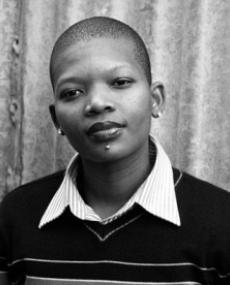
Eudy Simelane was born on 11 March 1977 in KwaThema, Springs, Transvaal (Gauteng). An active LGBTQI+ activist, she was one of the first women to live as openly lesbian in KwaThema.
Simelane was a successful soccer player and received national recognition for her talent on the field. She played as a midfielder for her local Springs Home Sweepers team, as well as for the South African woman’s national soccer team (Banyana Banyana) and used her status as a local soccer celebrity to further her LGBTQI+ activism.
Helping to foster a LGBTQI+ friendly culture in her community, Simelane’s bravery to live freely as a lesbian within her community established her as an inspiring and important LGBTQI+ icon.
On April 28, 2008, Simelane was attacked while leaving a local KwaThema pub. She was robbed of her personal belongs including her soccer trainers. Her attackers gang-raped and stabbed her 25 times. Dying from her wounds, her naked body was then dumped in a ditch just outside KwaThema.
Following her death, it became clear that Simelane’s status as an openly gay woman may have had an influence on her attack.
The concept of “correctional rape” involves the idea that raping an LGBTQI+ identifying woman will “cure” her of her sexuality. This violently homophobic practice has been a plague on South Africa’s LGBTQI+ community, particularly the black lesbian community in townships.
Following a trial, two of Simelane’s four attackers were convicted. Thato Mphithi and Themba Mvubu were the first men in South Africa to be convicted of ‘corrective’ rape despite there being over 30 reported cases in the decade before Simelane’s murder. Upon leaving the court, Mvubu—who was sentenced to life imprisonment—stated that he “was not sorry” for his crimes.
Following Simelane’s death, her family worked with the University of KwaZulu-Natal (UKZN) to create spaces to facilitate dialogue between the LGBTQI+ community and conservative religious leaders. From this project, the conceptualization of a public event as a forum for the intersection of religious doctrine and sexuality was born, culminating in the establishment of the Eudy Simelane Lecture.
The annual lecture aims to facilitate a process of change within faith-based organizations and religious society, opening the way for the possibility of LGBTQI+ acceptance by religious groups and establishing religion as a place of sanctuary rather than potential weapon against the LGBTQI+ community. The inaugural lecture was held on 7 April 2016.
Currently, Simelane’s legacy as an athletic icon continues under the custodianship of the Gay and Lesbian Archives (GALA). GALA’s Eudy Simelane Collection consists of a number of Simelane’s soccer items, including one box containing Simelane’s soccer boots, five medals and one whistle. The Simelane family donated the collection to GALA.